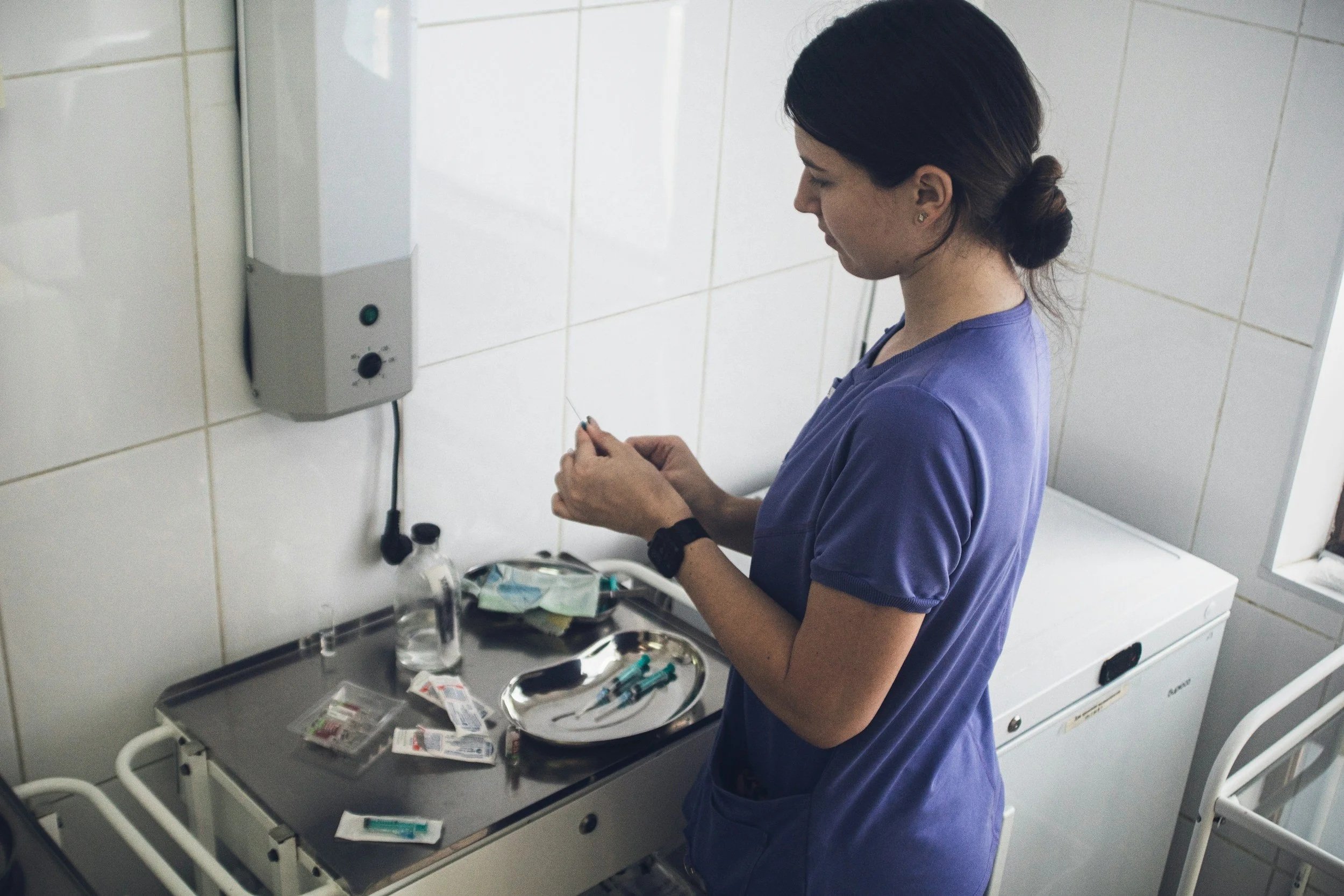Egg retrieval day is the most important day for any person undergoing the egg retrieval process for fertility preservation. It is the last day of the egg freezing process, concluding the exogenous hormone treatments and medications for the patient.
The Night Before
Getting a good night’s rest the night before the procedure is of upmost importance. If patients are doing the procedure under general anesthesia, it is imperative that they refrain from eating and drinking (except small sips of water) for at least 8 hours prior to the retrieval. This is intended to prevent any undigested food or fluids from moving up into the mouth and airway while under anesthesia. The procedure may be canceled if patients do not follow fasting requirements. Patients should check with their doctor about taking any regular medications the night before or the morning of the procedure. Patients typically wear loose, comfortable clothing and are asked to refrain from wearing contact lenses for the retrieval.
The Morning Before the Procedure
Essentially, an egg retrieval is a ten minute procedure where the patient can decide whether or not to use anesthesia. Most patients undergo the procedure with light general anesthesia, involving a short period of 15-20 minutes of sedation and a rapid wake up with a groggy feeling. This is the most common type of sedation used in this procedure because it is typically well tolerated. Patients with 1-2 follicles that have a normal anatomy might be able to tolerate the procedure with local anesthesia or without anesthesia altogether, however this is relatively uncommon. Leading up to the procedure, the patients arrive about an hour prior to the scheduled time for a preoperative evaluation and completion of consent forms.
During the Procedure
Once the patient is cleared, she is brought into the surgical suite where the team will do what’s called a “time-out”, during which the embryologist and the physician will review the details of the plan for the cycle and re-verify the patient’s name and date of birth. The egg retrieval procedure is performed transvaginally using ultrasound guidance, where a needle is inserted through the vaginal wall into both ovaries to collect the follicles. The fluid is collected in a test tube and is then given to the embryologist, who uses a microscope to determine if the oocytes are present in the follicle. Once the embryologist has visualized and counted the number of oocytes retrieved, the patient is usually notified immediately of the number attained. However, only the mature and viable oocytes will undergo the cryopreservation process, as they have the highest chance of becoming correctly fertilized later on. For most patients, about 80% of the eggs retrieved are frozen.
After the Procedure
Following the procedure, the patient will go to the recovery room where she’ll rest for 15-30 minutes and be monitored for any side effects. Based on how you feel, patients can then head home and are advised to take the day off of work/school and avoid any physical strain or lifting more than 10lbs. Some clinics may require an additional adult to drive the patient home post-procedure. Depending on the number of follicles, recovery time can be anywhere from 24 hours to up to a week, but the vast majority of people will be able to go to work the next day.
Patients might experience mild to moderate cramping, similar to menstrual cramps, and minor bleeding which may last up to 3 days following the procedure. Patients are advised to take acetaminophen (Tylenol) for pain and/or ibuprofen (Advil). Narcotics, such as opioid medications are not typically prescribed for pain control. If abdominal bloating and/or pelvic pain becomes increasingly worse, patients should inform the clinic immediately. Eating and drinking shortly after the procedure is permitted, however patients should avoid spicy or greasy foods and keep their diet light for the remainder of the day.

Dr. Jesse Hade is a compassionate and dedicated board-certified reproductive endocrinologist and infertility specialist with over 20 years of private practice experience. As one of the leading experts in fertility, Dr. Hade has mentored and trained many physicians currently in practice throughout the country and is an award-winning physician with numerous research studies.
Learn more about about Generation Next Fertility on Freeze.
Answered by Dr. Roy Handelsman from HRC Fertility. Understand how ovarian cysts and ovarian surgery may impact the egg freezing process.
Answered by Dr. Rashmi Kudesia from CCRM Fertility Houston. Here’s a checklist for before, during, and after your egg freezing consultation, including 11 questions you should ask the doctor.
Answered by Valerie Shafran, MSN, FNP-C from Extend Fertility. Discover why fertility experts urge women to stop taking GLP-1 agonists before an egg freezing cycle.
Answered by Dr. Nidhee Sachdev from South Coast Fertility Specialists. Explore what AMH tells us about a woman’s ovarian reserve or how many eggs she has left.
Answered by Dr. Hade from Generation Next Fertility. Understand how egg freezing does not cause long-term weight gain yet there is a chance of transient bloating.
Answered by Rijon Charne, JD from Sunray Fertility. Explore what a reproductive estate plan entails and the situations where having one can make a big difference.
Answered by Rijon Charne, JD from Sunray Fertility. Learn more about the importance of clinic disposition forms, including what they do and don’t cover.
Answered by Rijon Charne, JD from Sunray Fertility. Discover the legal nuances that can shape your options when freezing eggs or embryos.
Answered by Dr. Joshua Klein from Extend Fertility. Learn how birth control relates to egg freezing and if you will need to stop your hormonal birth control before starting the procedure.
Answered by Dr. Jesse Hade from Generation Next Fertility. Discover the important factors that affect chances of egg freezing success in your late thirties.
Answered by Sidonia Buchtova, PA-C, C-RHI from Refresh Psychiatry. Understand if you can stay on an SSRI or SNRI when freezing your eggs.
Answered by Sidonia Buchtova, PA-C, C-RHI from Refresh Psychiatry. Discover tips to help support your mental well-being during preparation, throughout the cycle, and after your egg retrieval, especially if you have a history of anxiety.
Answered by Dr. Katharina Spies from Vida Fertility. Learn about who should consider supplements before and during fertility preservation, and how supplements could support your egg freezing cycle.
Answered by Dr. Serin Seckin from Generation Next Fertility. Understand the key differences to help you make an informed decision that aligns with your personal and reproductive goals.
Answered by Dr. Ido Feferkorn from the Reproductive Medicine Group. Learn how Polycystic Ovarian Syndrome (PCOS) may affect the egg freezing process and outcomes of fertility preservation.
Answered by Dr. Meera Shah from Nova IVF. Understand the potential risks of egg freezing to help you evaluate if it is right for you.
Answered by Dr. Hade from Generation Next Fertility. Learn from start to finish the entire process of what happens on the final day of an egg freezing cycle.
Answered by Dr. Sahar M. Stephens from Northern California Fertility Medical Center. Understand the probability of pregnancy based on the number of eggs frozen and the age at which you freeze.
Answered by Dr. Alison Peck from HRC Fertility. Discover which medications are commonly used for ovarian stimulation during an egg freezing cycle.
Answered by Dr. Kathryn Snow from Piedmont Reproductive Endocrinology Group (PREG). Understand the side effects that you may experience when freezing your eggs.
Answered by Lia Schiller, MSN, AGNP-BC from Extend Fertility. Learn why IUDs can stay in place throughout the egg freezing process.
Answered by Dr. Woo from HRC Fertility. Learn how some medications need to be stopped for an egg freezing cycle while some medications can be continued.
Answered by Dr. Dan Nayot from The Fertility Partners. Learn how artificial intelligence is providing women with more information than ever before about their eggs.
Answered by Dr. Joshua Klein from Extend Fertility. Egg freezing doesn’t impact your chance of getting pregnant naturally, because egg freezing makes use of eggs that would otherwise have been lost.
Answered by Dr. Dan Nayot from The Fertility Partners. Understand the distinction between egg quantity and quality, and explore how AI is transforming egg quality analysis.
Answered by Dr. David E. Tourgeman from HRC Fertility. Understand what options exist for what to do with your frozen eggs if you decide not to use them for IVF.
Answered by Dr. Armando Hernandez-Rey from Conceptions Florida. Learn about minimal stimulation egg freezing cycles and how they can decrease the risk of ovarian hyperstimulation syndrome.
Answered by Dr. Ido Feferkorn from the Reproductive Medicine Group. Find out how egg freezing medications work and how protocols can be adjusted if you can’t take estrogen.
Answered by Dr. Ido Feferkorn from Reproductive Medicine Group. Learn how egg freezing fits into the menstrual cycle and how timing can be customized.
Answered by Dr. Elena Santiago from Vida Fertility. Understand the ins and outs of egg freezing in Spain as a non-resident, including timing, costs, and more.






























